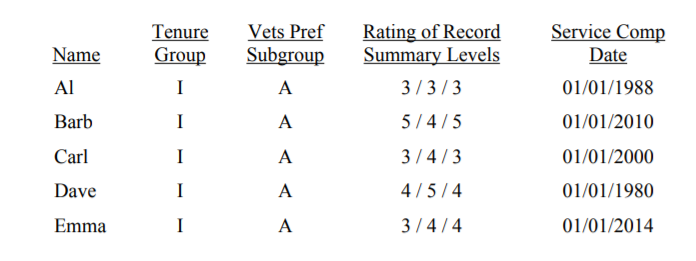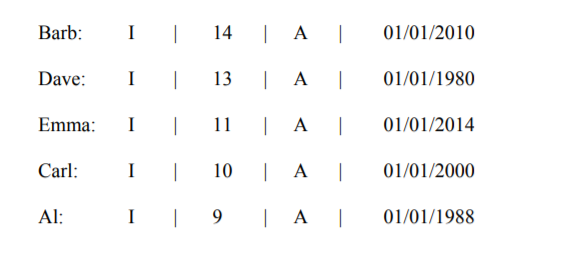
Who stays and who goes during a RIF? OPM wants to change the rules for retaining employees
Proposed regulations from the Office of Personnel Management prioritize an employee's performance over length of service when choosing who to retain during a...
The Office of Personnel Management wants to change the rules for prioritizing which employees to keep and which ones to cut in a reduction in force (RIF).
OPM will propose new draft regulations Thursday, which describe the agency’s plans to prioritize performance over length of service when choosing who to retain during a RIF.
The proposed rule makes good on yet another provision in President Donald Trump’s May 2018 executive order on employee firings and accountability, which called on OPM to review its existing regulations on RIF retention standards and update them.
“The proposed regulations will assist agencies in better aligning, consistent with law, to certain of the principles articulated by the president to the executive branch in [the executive order] and update current procedures to make them more efficient and effective,” OPM wrote in the proposed rule.
When creating a retention register for a RIF, OPM wants agencies to prioritize an employee’s tenure first, then performance, veterans preference and, finally, length of service.
Current regulations allow agencies to prioritize employees who have seniority, veterans preference and longer time in service when choosing who will stay at the organization during a RIF. An employee’s performance is the last priority when making those decisions, according to current regulations. And agencies use good performance ratings as a way to supplement an employee’s length of service.
But moving forward, OPM suggests a different priority order.
Agencies would first organize employees competing in a RIF by tenure. Then, they would rank employees by their performance based on the total of their three most recent ratings. Finally, agencies would weigh veteran’s preference and an employee’s length of service.
“Length of service will be used as a tie-breaker for employees with the same tenure, three-year total of their summary level performance ratings and veterans’ preference status (i.e., the first three factors being equal, an employee with longer length of service will be listed ahead of an employee(s) with shorter length of service),” OPM said.
The agency went on to describe specific examples with hypothetical employees.
In a group of five employees in the same tenure group and identical veterans preference, Dave and Al, the two employees with the longest service time, are first on agency’s list to keep during a RIF.

But under the new proposed rules, Barb, the employee with the highest total performance ratings and relatively few service years, would make the top of an agency’s retention list. Dave, the employee with the longest service time and second-highest performance ratings would rank second.
Al, the employee who made the top of an agency’s list under the old rules would rank last under the new regulations thanks to his performance scores, according to the OPM example.

OPM went on to describe other examples to account for more detailed hypothetical scenarios and more nuances in an agency’s performance rating system.
Members of the public have 30 days to comment on the proposed RIF rule changes.
The National Treasury Employees Union said it would draft formal comments on the proposed RIF rule changes, adding that it opposes any attempt to “discount the value of of retaining dedicated, veteran, experienced civil servants.”
“This proposed change is yet another piece of the outgoing administration’s agenda to do as much damage to the civil service as possible before it leave office,” Tony Reardon, NTEU’s national president, said in a statement.
OPM has spent much of the last year implementing provisions of the president’s three 2018 executive orders on collective bargaining, official time and employee firings.
The agency finalized regulations implementing several key pieces of the firing and accountability EO earlier this fall. The regulations went into effect in mid November, and OPM published a list of frequently-asked-questions last week to help agencies implement them.
OPM, along with the Chief Human Capital Officers Council, said it planned to work together to train agency managers on ways they can comply with the regulations and hold employees accountable for poor performance or misconduct.
President-elect Joe Biden has promised federal employee unions he’ll repeal the three 2018 executive orders.
Copyright © 2025 Federal News Network. All rights reserved. This website is not intended for users located within the European Economic Area.
Nicole Ogrysko is a reporter for Federal News Network focusing on the federal workforce and federal pay and benefits.
Follow @nogryskoWFED
Related Stories




